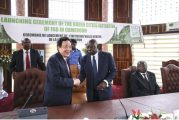Categories
Recent Posts
- Southern Cameroons refugees in Nigeria receive farm seedlings
- Douala: Investment Forum wraps up with honors for investment champions
- Understanding the Biya Francophone regime’s support for the Israeli genocide in Gaza
- US: Prosecution lays out ‘criminal conspiracy’ as Trump’s hush money trial opens
- FAO formally launches Green Cities Initiative in Cameroon
Archives
- April 2024
- March 2024
- February 2024
- January 2024
- December 2023
- November 2023
- October 2023
- September 2023
- August 2023
- July 2023
- June 2023
- May 2023
- April 2023
- March 2023
- February 2023
- January 2023
- December 2022
- November 2022
- October 2022
- September 2022
- August 2022
- July 2022
- June 2022
- May 2022
- April 2022
- March 2022
- February 2022
- January 2022
- December 2021
- November 2021
- October 2021
- September 2021
- August 2021
- July 2021
- June 2021
- May 2021
- April 2021
- March 2021
- February 2021
- January 2021
- December 2020
- November 2020
- October 2020
- September 2020
- August 2020
- July 2020
- June 2020
- May 2020
- April 2020
- March 2020
- February 2020
- January 2020
- December 2019
- November 2019
- October 2019
- September 2019
- August 2019
- July 2019
- June 2019
- May 2019
- April 2019
- March 2019
- February 2019
- January 2019
- December 2018
- November 2018
- October 2018
- September 2018
- August 2018
- July 2018
- June 2018
- May 2018
- April 2018
- March 2018
- February 2018
- January 2018
- December 2017
- November 2017
- October 2017
- September 2017
- August 2017
- July 2017
- June 2017
- May 2017
- April 2017
- March 2017
- February 2017
- January 2017
- December 2016
- November 2016
- October 2016
- September 2016
- August 2016
- July 2016
- June 2016
Featured
 Understanding the Biya Francophone regime’s support for the Israeli genocide in Gaza
Understanding the Biya Francophone regime’s support for the Israeli genocide in Gaza  Poverty under Biya: Cameroonians embrace Chinese language for brighter futures
Poverty under Biya: Cameroonians embrace Chinese language for brighter futures  Cameroon is broken: Who can fix it?
Cameroon is broken: Who can fix it?  Ethiopia: U.S Senator Cardin Statement on the Killing of Bate Urgessa
Ethiopia: U.S Senator Cardin Statement on the Killing of Bate Urgessa  Battle for the Unity Palace: ANNOUNCEMENT!
Battle for the Unity Palace: ANNOUNCEMENT!
Most Commented Posts
 4 Anglophone detainees killed in Yaounde
4 Anglophone detainees killed in Yaounde
19 comments Chantal Biya says she will return to Cameroon if General Ivo Yenwo, Martin Belinga Eboutou and Ferdinand Ngoh Ngoh are sacked
Chantal Biya says she will return to Cameroon if General Ivo Yenwo, Martin Belinga Eboutou and Ferdinand Ngoh Ngoh are sacked
13 comments Anglophone Nationalism: Barrister Eyambe says “hidden plans are at work”
Anglophone Nationalism: Barrister Eyambe says “hidden plans are at work”
12 comments The Anglophone Problem – When Facts don’t Lie
The Anglophone Problem – When Facts don’t Lie
12 comments Largest wave of arrest by BIR in Bamenda
Largest wave of arrest by BIR in Bamenda
10 comments
Latest Tweets
Featured
-

Southern Cameroons refugees in Nigeria receive farm seedlings
-

Douala: Investment Forum wraps up with honors for investment champions
-

Understanding the Biya Francophone regime’s support for the Israeli genocide in Gaza
-

US: Prosecution lays out ‘criminal conspiracy’ as Trump’s hush money trial opens
-

FAO formally launches Green Cities Initiative in Cameroon
-

Football: Barcelona wants Clasico replay if Yamal ‘ghost goal’ call wrong
-

Poverty under Biya: Cameroonians embrace Chinese language for brighter futures
© Cameroon Concord News 2024
9, November 2019
How to stop Cameroon collapsing into a full-fledged civil war 0
by soter • Editorial, Headline News
For 37 years one man has ruled Cameroon, a staggeringly corrupt, oil-rich state in central Africa. President Paul Biya is an old-fashioned autocrat. When democracy swept across Africa after the cold war ended, he called it a “distasteful passing fetish”. Then he realised he would attract less foreign criticism if he quietly intimidated opponents and rigged elections instead of banning them. He has done so ever since, and kept on good terms with Western powers by posing as a champion of stability in a fissile region. His troops, trained and equipped by France, Israel and America, battle the jihadists of Boko Haram and Islamic State around Lake Chad. They also regularly don blue helmets to keep peace in countries such as the Central African Republic. Yet Mr Biya cannot keep the peace at home.
Instead, a country that was once seen as an exporter of security is now being wrenched apart. A secession struggle rages in its English-speaking regions. Government forces are burning villages, shooting young men and raping women. The conflict has killed thousands and forced more than 500,000 people from their homes.
The strife began as a series of peaceful protests in 2016. Anglophones were aggrieved at their marginalisation in a country dominated by French-speakers. Cameroon is too rigidly centralised to satisfy minorities: only 1% of government spending is locally controlled, compared with more than 50% in neighbouring Nigeria. Strikes and demonstrations over the erosion of English-style common law and the dominance of Francophone officials have since mutated into what looks like a civil war. It could get much worse, as chaos grows, armed separatists kill and soldiers inflict horrors on civilians.
The outside world has barely noticed this disaster unfolding. Appeals for emergency assistance have attracted less than one-fifth of their target: less than half the people who have lost their homes have been given the two pieces of plastic and rope that make up the un’s shelter kit. Cameroon’s main backers have looked away, hoping Mr Biya’s government would quell the rebellion and get back to fighting jihadists in the Sahel. Instead of corralling the warring parties, the African Union and un Security Council have stood aside, rousing themselves only to “welcome” and “praise” Mr Biya’s “national dialogue”, a sham to which key separatist leaders were not invited.
This is a disgrace. The conflict, although bloody, is not intractable. Most people in Cameroon’s two English-speaking regions are probably moderate and would be happy with some more autonomy and an end to the fighting. They could find common ground with those on the government side who might be willing to give a bit more power to the regions.
The longer the fighting persists, the harder it will be to resolve. With the army and separatists in stalemate on the battlefield, peace can come only through talks. For those to happen, both sides need to build trust. The separatists should start by lifting the ruinous ban they enforce on children going to government schools in the areas they control, which threatens to create a lost generation of illiterates. Rebel leaders abroad should tone down their inflammatory talk of secession. The government should release political prisoners and prosecute soldiers responsible for abuses.
Outsiders should press Mr Biya to make peace. President Donald Trump has rightly scaled back military assistance because of atrocities committed by the army. He has also kicked Cameroon out of a programme which grants duty-free access to the us market to African countries that respect human rights. European governments should also turn the screws, especially France, Mr Biya’s closest ally. The ageing strongman once said that only one-party rule could hold Cameroon together. In fact, his overcentralised autocracy has created pressures that could blow it apart. Only dialogue and devolution can save it.
Culled from The Economist